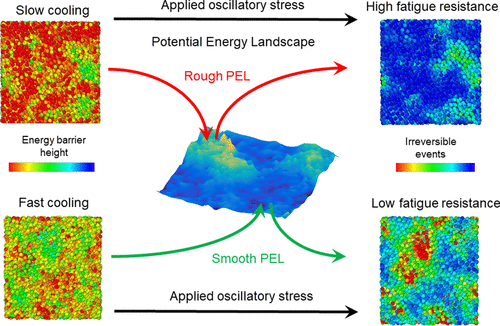当前位置:
X-MOL 学术
›
J. Phys. Chem. B
›
论文详情
Our official English website, www.x-mol.net, welcomes your feedback! (Note: you will need to create a separate account there.)
Bulk Metallic Glasses’ Response to Oscillatory Stress Is Governed by the Topography of the Energy Landscape
The Journal of Physical Chemistry B ( IF 3.3 ) Pub Date : 2020-11-24 , DOI: 10.1021/acs.jpcb.0c08794 Longwen Tang 1, 2 , Gang Ma 1 , Han Liu 2 , Wei Zhou 1 , Mathieu Bauchy 2
The Journal of Physical Chemistry B ( IF 3.3 ) Pub Date : 2020-11-24 , DOI: 10.1021/acs.jpcb.0c08794 Longwen Tang 1, 2 , Gang Ma 1 , Han Liu 2 , Wei Zhou 1 , Mathieu Bauchy 2
Affiliation

|
When subjected to cyclic loading, bulk metallic glasses tend to exhibit fatigue-induced damage. Although fatigue is a key limitation of metallic glasses, its atomic origin remains elusive. Here, based on molecular dynamics simulations, we investigate the response of metallic glasses prepared with varying cooling rates to oscillatory stress. We find that fatigue manifests itself as an accumulation of residual strain, which results from some nonaffine displacement of the atoms. Such local reorganizations are promoted under a high cooling rate. Importantly, we demonstrate that the fatigue-induced dynamics of the atoms is encoded in the topography of the static energy landscape, i.e., before any load is applied.
中文翻译:

大块金属玻璃对振动应力的响应受能量景观地形的支配
当经受周期性载荷时,块状金属玻璃倾向于表现出疲劳引起的损坏。尽管疲劳是金属玻璃的主要限制因素,但其原子起源仍然难以捉摸。在这里,基于分子动力学模拟,我们研究了冷却速率不同的金属玻璃对振荡应力的响应。我们发现疲劳表现为残余应变的累积,这是由于原子的某些非仿射位移造成的。在高冷却速率下促进了这种局部重组。重要的是,我们证明了原子诱发的疲劳动力学是在静态能量分布的地形中编码的,即在施加任何载荷之前。
更新日期:2020-12-10
中文翻译:

大块金属玻璃对振动应力的响应受能量景观地形的支配
当经受周期性载荷时,块状金属玻璃倾向于表现出疲劳引起的损坏。尽管疲劳是金属玻璃的主要限制因素,但其原子起源仍然难以捉摸。在这里,基于分子动力学模拟,我们研究了冷却速率不同的金属玻璃对振荡应力的响应。我们发现疲劳表现为残余应变的累积,这是由于原子的某些非仿射位移造成的。在高冷却速率下促进了这种局部重组。重要的是,我们证明了原子诱发的疲劳动力学是在静态能量分布的地形中编码的,即在施加任何载荷之前。


























 京公网安备 11010802027423号
京公网安备 11010802027423号